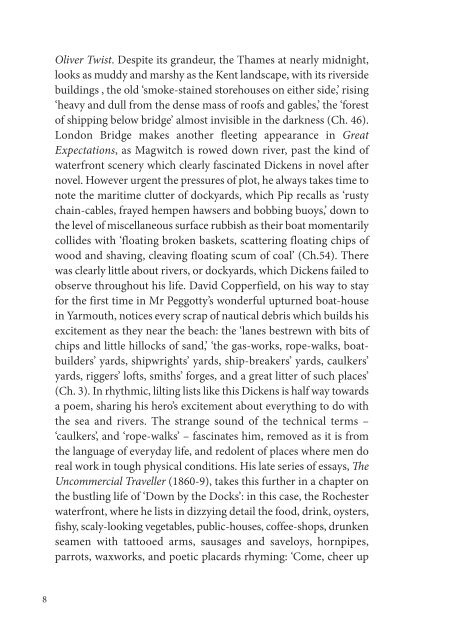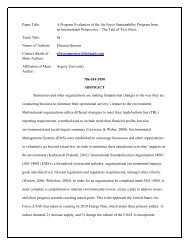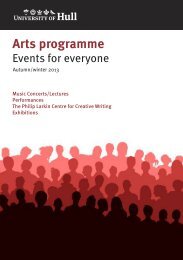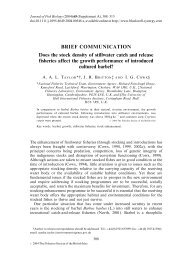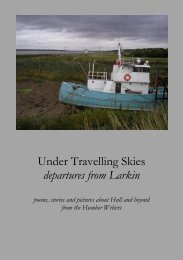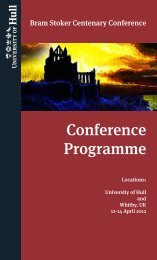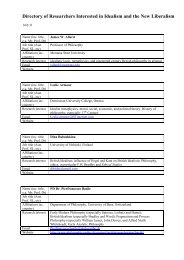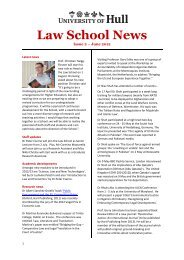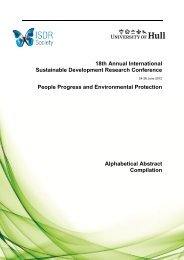Sketches, Dispatches, Hull Tales and Ballads - University of Hull
Sketches, Dispatches, Hull Tales and Ballads - University of Hull
Sketches, Dispatches, Hull Tales and Ballads - University of Hull
You also want an ePaper? Increase the reach of your titles
YUMPU automatically turns print PDFs into web optimized ePapers that Google loves.
8<br />
Oliver Twist. Despite its gr<strong>and</strong>eur, the Thames at nearly midnight,<br />
looks as muddy <strong>and</strong> marshy as the Kent l<strong>and</strong>scape, with its riverside<br />
buildings , the old ‘smoke-stained storehouses on either side,’ rising<br />
‘heavy <strong>and</strong> dull from the dense mass <strong>of</strong> ro<strong>of</strong>s <strong>and</strong> gables,’ the ‘forest<br />
<strong>of</strong> shipping below bridge’ almost invisible in the darkness (Ch. 46).<br />
London Bridge makes another fleeting appearance in Great<br />
Expectations, as Magwitch is rowed down river, past the kind <strong>of</strong><br />
waterfront scenery which clearly fascinated Dickens in novel after<br />
novel. However urgent the pressures <strong>of</strong> plot, he always takes time to<br />
note the maritime clutter <strong>of</strong> dockyards, which Pip recalls as ‘rusty<br />
chain-cables, frayed hempen hawsers <strong>and</strong> bobbing buoys,’ down to<br />
the level <strong>of</strong> miscellaneous surface rubbish as their boat momentarily<br />
collides with ‘floating broken baskets, scattering floating chips <strong>of</strong><br />
wood <strong>and</strong> shaving, cleaving floating scum <strong>of</strong> coal’ (Ch.54). There<br />
was clearly little about rivers, or dockyards, which Dickens failed to<br />
observe throughout his life. David Copperfield, on his way to stay<br />
for the first time in Mr Peggotty’s wonderful upturned boat-house<br />
in Yarmouth, notices every scrap <strong>of</strong> nautical debris which builds his<br />
excitement as they near the beach: the ‘lanes bestrewn with bits <strong>of</strong><br />
chips <strong>and</strong> little hillocks <strong>of</strong> s<strong>and</strong>,’ ‘the gas-works, rope-walks, boatbuilders’<br />
yards, shipwrights’ yards, ship-breakers’ yards, caulkers’<br />
yards, riggers’ l<strong>of</strong>ts, smiths’ forges, <strong>and</strong> a great litter <strong>of</strong> such places’<br />
(Ch. 3). In rhythmic, lilting lists like this Dickens is half way towards<br />
a poem, sharing his hero’s excitement about everything to do with<br />
the sea <strong>and</strong> rivers. The strange sound <strong>of</strong> the technical terms –<br />
‘caulkers’, <strong>and</strong> ‘rope-walks’ – fascinates him, removed as it is from<br />
the language <strong>of</strong> everyday life, <strong>and</strong> redolent <strong>of</strong> places where men do<br />
real work in tough physical conditions. His late series <strong>of</strong> essays, e<br />
Uncommercial Traveller (1860-9), takes this further in a chapter on<br />
the bustling life <strong>of</strong> ‘Down by the Docks’: in this case, the Rochester<br />
waterfront, where he lists in dizzying detail the food, drink, oysters,<br />
fishy, scaly-looking vegetables, public-houses, c<strong>of</strong>fee-shops, drunken<br />
seamen with tattooed arms, sausages <strong>and</strong> saveloys, hornpipes,<br />
parrots, waxworks, <strong>and</strong> poetic placards rhyming: ‘Come, cheer up


